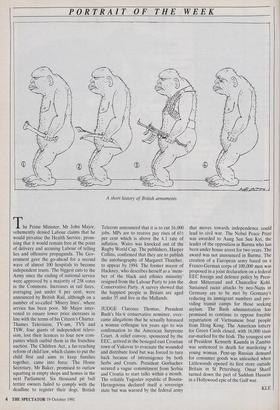PORTRAIT OF THE WEEK
A short history of British armaments.
The Prime Minister, Mr John Major, vehemently denied Labour claims that he would privatise the Health Service, prom- ising that it would remain free at the point of delivery and accusing Labour of telling lies and offensive propaganda. The Gov- ernment gave the go-ahead for a second wave of almost 100 hospitals to become independent trusts. The biggest cuts to the Army since the ending of national service were approved by a majority of 258 votes in the Commons. Increases in rail fares, averaging just under 8 per cent, were announced by British Rail, although on a number of so-called 'Misery lines', where service has been poor, Mr Major inter- vened to ensure lower price increases in line with the terms of his Citizen's Charter. Thames Television, TV-am, TVS and TSW, four giants of independent televi- sion, lost their licences to four new com- panies which outbid them in the franchise auction. The Children Act, a far-reaching reform of child law, which claims to put the child first and aims to keep families together, came into force. The Home Secretary, Mr Baker, promised to outlaw squatting in empty shops and homes in the next Parliament. Six thousand pit bull terrier owners failed to comply with the deadline to register their dogs. British Telecom announced that it is to cut 16,000 jobs. MPs are to receive pay rises of 61/2 per cent which is above the 4.1 rate of inflation. Wales was knocked out of the Rugby World Cup. The publishers, Harper Collins, confirmed that they are to publish the autobiography of Margaret Thatcher, to appear by 1994. The former mayor of Hackney, who describes herself as a 'mem- ber of the black and ethnics minority' resigned from the Labour Party to join the Conservative Party. A survey showed that the happiest people in Britain are aged under 35 and live in the Midlands.
JUDGE Clarence Thomas, President Bush's bla:-Ic conservative nominee, over- came allegations that he sexually harassed a woman colleague ten years ago to win confirmation to the American Surpreme Court. A relief convoy, sponsored by the EEC, arrived in the besieged east Croatian town of Vukovar to evacuate the wounded and distribute food but was forced to turn back because of intransigence by both Serbs and Croats. President Gorbachev secured a vague commitment from Serbia and Croatia to start talks within a month. The volatile Yugoslav republic of Bosnia- Herzegovina declared itself a sovereign state but was warned by the federal army that moves towards independence could lead to civil war. The Nobel Peace Prize was awarded to Aung San Suu Kyi, the leader of the opposition in Burma who has been under house arrest for two years. The award was not announced in Burma. The creation of a European army based on a Franco-German corps of 100,000 men was proposed in a joint declaration on a federal EEC foreign and defence policy by Presi- dent Mitterrand and Chancellor Kohl. Sustained racist attacks by neo-Nazis in Germany are to be met by Germany's reducing its immigrant numbers and pro- viding transit camps for those seeking asylum. The Bush administration has promised to continue to oppose forcible repatriation of Vietnamese boat people from Hong Kong. The American lottery for Green Cards closed, with 16,000 visas ear-marked for the Irish. The youngest son of President Kenneth Kaunda in Zambia was sentenced to death for murdering a young woman. Pent-up Russian demand for consumer goods was unleashed when Littlewoods opened its first store outside Britain in St Petersburg. Omar Sharif turned down the part of Saddam Hussein in a Hollywood epic of the Gulf war.
KLE


























































 Previous page
Previous page